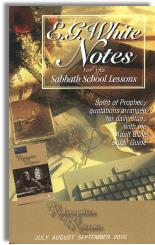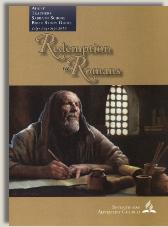|
||||||||||||||
Commentary on "Jew and Gentile"
Day 5: Wednesday, July 7, 2010 - No Greater Burden
Overview
This lesson looks at the conclusion of the Jerusalem Council. Ellen White says that the Judaizers wanted to incorporate Jewish law and ceremonies “into the rites of the Christian religion.”
The lesson refers to verse 10 of Acts 15 where Peter says the laws had been a “yoke” that none of them had been abel to bear, and it goes on to comment that God would never give people something that would be a burden, but the leaders had turned laws which were meant to be blessings into burdens. It also makes the point that there was no mention of the Gentiles not needing to keep the 10 Commandments.
Further, they look at the requirements implemented, abstaining from meats offered to idols, from eating blood, from fornication, and from eating the meat of strangled animals. Then the lesson says that the argument that Sabbath was not required because it was not mentioned in the requirements is an argument that “means nothing” since murder and lying weren’t specifically mentioned, either.
Observations
This lesson is full of straw-man arguments and reasoning built on false foundations. First, the argument that God would never give something that was a burden, that the “yoke” of the law Peter mentioned was simply the effect of rabbinic additions to the law, is a spurious argument. In Acts 15:10 Peter says, “Now therefore why do you put God to the test by placing upon the neck of the disciples a yoke which neither our fathers nor we have been able to bear?”
When the apostles referred to “our fathers”, they were not referring to their most recent ancestors. “The fathers” referred back to ancient times, to the great fathers and heroes of Israel. Peter is saying that throughout Israel’s history, the law’s requirements were a yoke under which they had always suffered.
To say God would never give people something that was a yoke or a burden is to rewrite Scripture. The Scripture says these laws were a yoke. These are God’s words to us, and they mean what they say.
Furthermore, Romans is full of passages describing the law—the moral law, at that—as something designed to increase and reveal sin. The law contained a curse—banishment, death, and suffering for anyone who disobeyed it. The law was not “fun”. It was hard to live with continual blood sacrifices, with taking one’s firstfruits and best livestock to the temple, slitting the throats of the animals, getting one’s own animal’s blood on one’s hands as one sacrificed for sin, and then watching the priests take the best parts for the Lord and for themselves.
The law was relentless and very, very restricting. Of course, it also revealed God’s grace and blessing, but it was not easy to be vigilant and observant of all the details. When Peter says is was a yoke, he meant it, and we cannot reason away what he said in order to make a point or to imagine that God would never give someone a “burden”.
By way of example, 2 Corinthians 12 describes Paul’s thorn in his flesh which God gave him to keep him from being conceited. It was a very great yoke which he begged God to remove, but God would not, saying instead that His strength was made perfect in Paul’s weakness.
The Ten Commandments
The lesson points out that there was no mention of the Gentiles not needing to keep the Ten Commandments. “After all, could we imagine the council telling them not to eat blood, but that it was acceptable to ignore the commandments against adultery or murder and the like?”
This reasoning is pure supposition and speculation. It is a straw-man argument, not addressing the actual facts of the text.
First, the Sabbath, which is the primary point of these arguments, was the sign of the Mosaic covenant. Typical of all near-east Hittite treaties, the Mosaic covenant put the vassals sign of allegiance right in the center of the terms of the covenant. The Sabbath was that sign—the repeated sign that the vassals—Israel—were keeping their end of the new treaty between them and the conquering Lord. The Sabbath, being the sign of that covenant (and remember that Exodus and Deuteronomy both called the Ten Commandment s the very words of the covenant), is valid only as long as that covenant lasts.
The entire New Testament describes the way a Christian is to live, and nowhere in the lists of sins no allowed in the kingdom of heaven is Sabbath-breaking ever listed.
Moreover, Gentiles were not obliged to keep the Ten Commandments. They were obliged to live by the Spirit and to put to death the deeds of the flesh (Romans 8). The Spirit, who is the actual Author of the law, is greater than the law and is the One Jesus said would convict the world of sin, of righteousness, and of judgment (John 16:8-11).
Morality is eternal because it comprises many of the attributes of God. The law was temporary (Gal. 3:15-17). It was created and given by God. Morality, on the other hand, is the literal substance of God’s attributes.
When the Jerusalem Council did not require the Gentiles to take on any law except the ancient Noahic laws that would make it possible for them to eat with the Jews, that lack of law was inclusive. The Holy Spirit is quite capable of convicting the Gentiles, in conjunction with Scripture, how to live moral lives.
For the lesson to say, “Some say that, because Sabbath keeping wasn’t specifically mentioned, it must not have been meant for the Gentiles (of course, the commandments against lying and murder weren’t specifically mentioned either, so that argument means nothing),” is sarcastic and a straw-man argument.
The entire Scripture, Old and New Testaments, describe moral living. The law was clearly given 430 years after Abraham and lasted until Jesus came (Gal. 3:15-17). Morality both predated the law and succeeds the law. It, like the other attributes of God including His omniscience, omnipresence, and love, is eternal, and it is not defined by a law. The law was simply given to point out sin. Morality has always been part of God’s revelation of Himself and His divine nature and His authority over us.
Summary
- When Peter said the law was a burden neither they nor their fathers could bear, he meant it. He was not referring to the notion of rabbinic additions to the law; that idea is not in Scripture.
- God sometimes does give people things that are burdens, such as Paul’s thorn in his flesh, for God’s glory and our good.
- The Ten Commandments were not given to the Gentiles to keep.
- The Holy Spirit has put the law in our hearts, and He is capable of convicting us of sin, righteousness, and judgment in conjunction with Scripture.
- Sabbath was the sign of the Mosaic covenant. When that covenant became obsolete, so did the sign.
- Morality transcends the law. It predated the law (given 430 years after Abraham), and it is still with us now although the law ended when the Seed came (Gal. 3:15-17).
- Scripture is full of description of how Christians are to live and of sins that are not allowed in the kingdom of God.
- As born-again Christians, we have the ability to surrender temptation to God at the moment it happens.
- Morality is part of God’s nature. It is eternal. The law, by contrast, was created by God and given for a time. Morality is eternal and part of God. The law was temporary and was a creation of God.
Copyright 2010 BibleStudiesForAdventists.com. All rights reserved. Revised July 3, 2010. This website is published by Life Assurance Ministries, Glendale, Arizona, USA, the publisher of Proclamation! Magazine. Contact email: BibleStudiesForAdventists@gmail.com.
The Sabbath School Bible Study Guide and the corresponding E.G. White Notes are published by Pacific Press Publishing Association, which is owned and operated by the Seventh-day Adventist church. The current quarter's editions are pictured above.
Official Adventist Resources
Standard Edition Study Guide Week 2
Teacher's Edition Study Guide Week 2
Easy Reading Edition Study Guide Wk 2
Search the Complete Published Ellen G. White Writings


